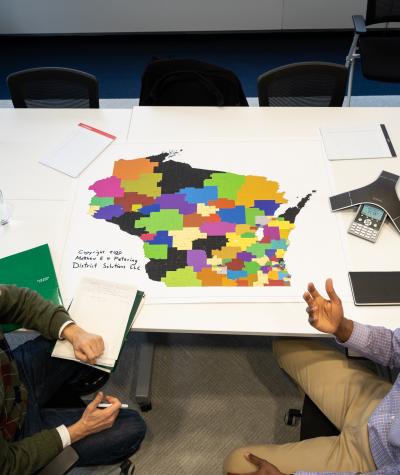This year brings a once-in-a-decade window of opportunity to strip self-interested politicians of the ability to create voting districts that favor their reelection and give voters the power to choose their politicians. During the 2021 redistricting cycle, it is possible to make our democracy more responsive, enabling everyone to have their vote count equally and their voice be heard.
State legislators and wealthy special interests who want to maintain or expand their own power have silenced the people’s voices for too long. To create voting maps that truly allow every person’s vote to count fairly, redistricting commissions should play a key role in the redistricting process, as they already do in 14 states across the country.
For states with redistricting commissions, the report “Designing a Transparent and Ethical Redistricting Process: A Guide to Ensuring that the Redistricting Process is Fair, Open, and Accessible” by Campaign Legal Center (CLC) and the League of Women Voters highlights how making commissioners adhere to strong ethics provisions enhances the redistricting process.
Redistricting lies at the heart of American democracy. It is the process of redrawing the voting maps within each state to determine new districts. At the start of each decade, the U.S. conducts a census to count everyone residing in the country and uses the data to determine government resource allocation.
In 2020, the census was conducted, although the gathering and finalizing of that data has been delayed due to COVID-19. The 2020 Census will help distribute $1.5 trillion to communities across the country and will be used for the 2021 redistricting cycle. Like the Census, redistricting happens only once every 10 years, meaning this is the last chance to make new voting maps until 2031.
Given the high stakes of getting this right, the public must be able to trust that commissioners will not be dominated by one side’s partisan interest.
The report emphasizes that commissioners must be held to the highest standards possible for ethical conduct. They have an obligation to keep communities of interest together so that they are adequately represented in government.
For instance, most states bar those who were recently or are currently elected officials, political party officials, lobbyists, or government employees from serving on their commission. States should do the same for the staff and consultants hired by the commission.
Commissioners should not be able to ask for or receive gifts and should be prohibited from running for office for a certain amount of time after leaving the commission. These provisions will help avoid the appearance that they made maps for the sole purpose of benefitting themselves.
Additionally, according to the report, the public should be encouraged to participate through a transparent and inclusive redistricting process.
This includes posting information about steps of the redistricting process online, making meetings accessible both in person and virtually, allowing the public to submit and audit maps, and applying Freedom of Information Act (FOIA) laws to the commission’s deliberation process.
While having a redistricting commission goes a long way toward making redistricting fairer and more transparent, as people across the country fight to strengthen democracy, they should try to establish an independent ethics commission in their home state to hold members of their redistricting commission accountable.
Ethics commissions can take enforcement action against those who violate ethics rules while serving on redistricting commissions and bolster compliance with financial disclosure, lobbying, and campaign finance laws more broadly.
Democracy advocates should also know that CLC will assist them should state legislators, political parties, or wealthy special interests move to thwart their efforts to redistrict in a manner that benefits the public and promotes stronger ethics rules.
With trust in American democracy deteriorating, we must work to ensure that elections are determined by people instead of politicians in the next decade. Transparent and accountable commissions with strong ethics rules are essential to a fair redistricting process that benefits the public.
